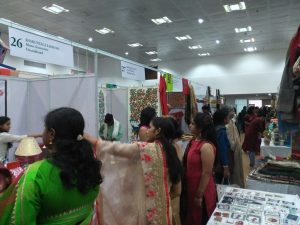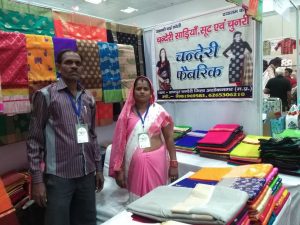An ode to women and environment
Vibrant, colourful and artistic – the seventh edition of the annual Shilpkala Utsav showcased India’s rich cultural heritage while also highlighting the indubitable role of women in environmental conservation.

Arts, crafts and textiles surrounded you as you entered New Delhi’s Aga Khan Hall located at Bhagwan Das Road – the centre for the seventh edition of the annual women artisans’ crafts bazaar called ‘Shilpkala Utsav’.
Jamdhani sarees, handmade earrings, pouches or potlis, paper mache, sandals, pillow cases, showpieces and such indigenously crafted items were on sale at the All India Women’s Conference (AIWC)-organised three-day bazaar which concluded on October 25.
Around 60 stalls displayed varied products created and brought by women artisans, NGOs and entrepreneurs across 19 states on the theme of ‘Environment’.
“We wanted to highlight how environment and women connect. They are more upfront in up-keeping the environment and not exploit it. Yet, they fail to be included in policies or at the time of policy planning and implementation,” Kalyani Raj, AIWC Secretary General, told Delhi Post.
The annual event was inaugurated by Ambassador of Mexico in India, H.E. Melba Pria, who took a stroll and was seen asking questions on the crafts displayed.
Aiming at empowerment of women artisans and their families and at a direct artisan-to-consumer platform as well as promotion of innovative and traditional crafts, AIWC offered “free stall spaces” to the selected artisans and “will not be taking any share” from their sales, added Raj.
Also Read : A New Lease on Life: Street to School
“There are so many women working with recycled products or anything to do with water or fabric or even technology. So, we wanted to give them an opportunity to showcase their products and provide them a direct link with the consumers as half the time, middlemen rule,” Raj further said.
“The chosen artisans were all working with aspects of environmental conservation in some or the other ways.”

After passing class eighth, Nisha was forced to quit her studies. Now as a 19-year-old girl, she trained herself with painting and handicrafts as part of Raibaar training programme in skill development for rural women of Laldhang, a small town located near Haridwar, Uttarakhand. “I initially thought only educated people can do everything. Now, I feel I can do anything,” Nisha told Delhi Post, adding that with a salary of Rs 3000, she gets to travel and exhibit her work in places like Dehradun and Delhi.
Designer and proprietor Shruti Lakhera Tyagi, who has already trained 25 girls and women as part of Raibaar initiative with the support of IAS Deepak Rawat, District Magistrate Haridwar and Anjani Rawat, General Manager, District Industries Centre, Haridwar, informed Delhi Post that ‘Raibaar’ means ‘a message’ in Uttarakhand’s Garhwali language. “The message here is that given a chance, these rural area women can work for betterment of their families and the society by becoming self-employed and independent,” she said.
“Laldhang is a small village near Haridwar which lacks basic infrastructure and facilities and worse is the condition of women because male migration is a big issue which means that women have to take up the responsibility of the household and become independent. Vocational skills become helpful as they can pursue their livelihood from their homes without neglecting their household,” Shruti told Delhi Post.
Besides handicrafts and tailoring, bee-keeping, sericulture and alternative farming methods are sustainable practices that women are encouraged to pursue shared Shruti who has started to work in sericulture or production of silk and rearing of silkworms.
Also Read : Full throttle on a note of parity
Present at the event was State Awardee Bhanu Seshu M from Andhra Pradesh’s Komaragiri village, who was busily showcasing Jamdhani Uppada sarees to two women customers who asked her about the specifications. During the animated exchange, she revealed that for Shilpkala Utsav, a saree of Rs 7000 was priced at Rs 6000. Interestingly, the Komaragiri village which has many weaver families was adopted around two decades ago by AIWC Delhi. “Often referred to as Uppada Jamdani, the Uppada Pattu, known for intricate designs and zari work, has been popular among women and enhances their beauty. But not many know that the lightweight pattu also gives livelihood opportunities to weavers and their families in Komaragiri, which is the major producer of such sarees,” Bhanu Seshu told Delhi Post.
Another such weaver who came all the way from Madhya Pradesh’s Chanderi was Janki Bai who showcased chanderi sarees which are known for their crisp silk notes. Janki who has spent weaving chanderi sarees for the past 10 years, told Delhi Post with a smile, “It feel so good to showcase your work and earn because of it.”
